小学英语六年级一般将来时复习
2023年小学英语六年级小升初语法总复习(四)一般将来时 (译林版含答案)
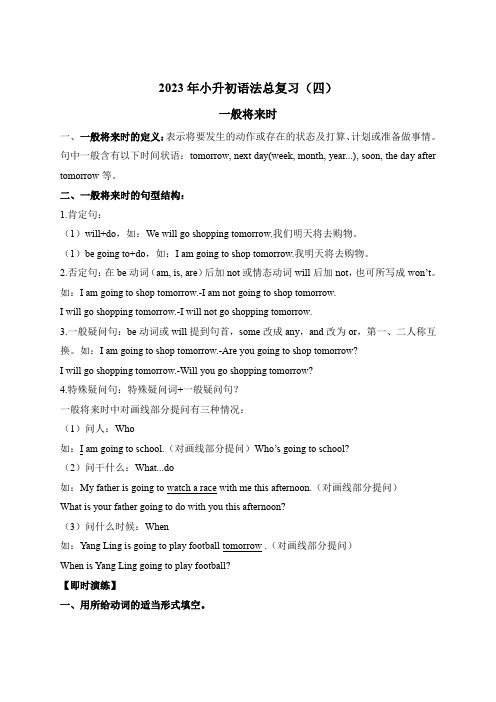
2023年小升初语法总复习(四)一般将来时一、一般将来时的定义:表示将要发生的动作或存在的状态及打算、计划或准备做事情。
句中一般含有以下时间状语:tomorrow, next day(week, month, year...), soon, the day after tomorrow等。
二、一般将来时的句型结构:1.肯定句:(1)will+do,如:We will go shopping tomorrow.我们明天将去购物。
(1)be going to+do,如:I am going to shop tomorrow.我明天将去购物。
2.否定句:在be动词(am, is, are)后加not或情态动词will后加not,也可所写成won’t。
如:I am going to shop tomorrow.-I am not going to shop tomorrow.I will go shopping tomorrow.-I will not go shopping tomorrow.3.一般疑问句:be动词或will提到句首,some改成any,and改为or,第一、二人称互换。
如:I am going to shop tomorrow.-Are you going to shop tomorrow?I will go shopping tomorrow.-Will you go shopping tomorrow?4.特殊疑问句:特殊疑问词+一般疑问句?一般将来时中对画线部分提问有三种情况:(1)问人:Who如:I am going to school.(对画线部分提问)Who’s going to school?(2)问干什么:What...do如:My father is going to watch a race with me this afternoon.(对画线部分提问)What is your father going to do with you this afternoon?(3)问什么时候:When如:Yang Ling is going to play football tomorrow .(对画线部分提问)When is Yang Ling going to play football?【即时演练】一、用所给动词的适当形式填空。
小学六年级英语一般将来时四个句型
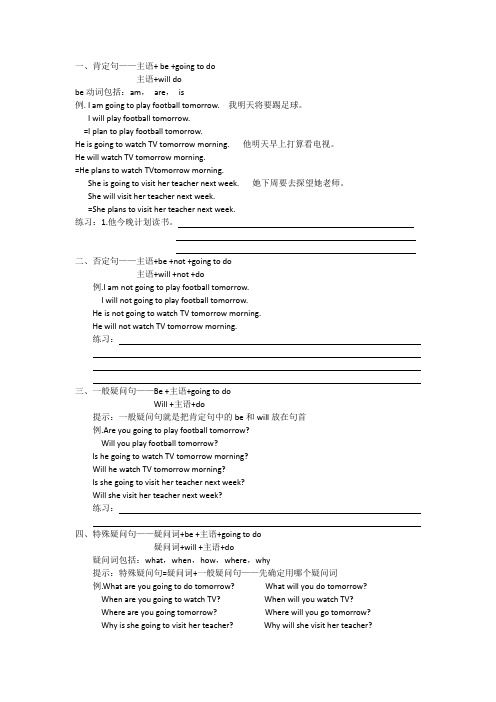
一、肯定句——主语+ be +going to do主语+will dobe动词包括:am,are,is例. I am going to play football tomorrow. 我明天将要踢足球。
I will play football tomorrow.=I plan to play football tomorrow.He is going to watch TV tomorrow morning. 他明天早上打算看电视。
He will watch TV tomorrow morning.=He plans to watch TVtomorrow morning.She is going to visit her teacher next week. 她下周要去探望她老师。
She will visit her teacher next week.=She plans to visit her teacher next week.练习:1.他今晚计划读书。
二、否定句——主语+be +not +going to do主语+will +not +do例.I am not going to play football tomorrow.I will not going to play football tomorrow.He is not going to watch TV tomorrow morning.He will not watch TV tomorrow morning.练习:三、一般疑问句——Be +主语+going to doWill +主语+do提示:一般疑问句就是把肯定句中的be和will放在句首例.Are you going to play football tomorrow?Will you play football tomorrow?Is he going to watch TV tomorrow morning?Will he watch TV tomorrow morning?Is she going to visit her teacher next week?Will she visit her teacher next week?练习:四、特殊疑问句——疑问词+be +主语+going to do疑问词+will +主语+do疑问词包括:what,when,how,where,why提示:特殊疑问句=疑问词+一般疑问句——先确定用哪个疑问词例.What are you going to do tomorrow? What will you do tomorrow?When are you going to watch TV? When will you watch TV?Where are you going tomorrow? Where will you go tomorrow?Why is she going to visit her teacher? Why will she visit her teacher?。
最新人教pep版小学英语毕业专项复习——第四部分 时态精析 第四节一般将来时

A. have
B. is having
C. will have
返回目录
( C )5. Oliver: Are you going to the park? Tom: Yes,
_____.
A. he is
B. I will
C. I am
返回目录
三、Ask and answer. 根据答句写问句。 1. A: __W__h_a_t'_s_t_h_e_w__e_a_th_e_r__li_k_e_t_o_m__o_r_ro_w__?__/H__o_w_'_s_t_h_e
返回目录
3. A: __I_s_s_h_e__g_o_in_g__to__c_o_o_k_d__in_n_e_r_?_____ B: Yes,she is going to cook dinner.
4. A: ___W__h__er_e__a_r_e_y_o_u__g_o_in_g_?_________ B: I'm going to Beijing. 5. A: ___W__h_a_t_a_r_e__y_o_u_g_o_i_n_g__to__d_o_?_____
返回目录
二、一般将来时的句型结构 1. be going to结构 (1) 肯定句:主语+be going to+动词原形+其他。 如: I'm going to go fishing this week. 这周我打算去钓鱼。 Tom's father is going to wash the car today. 今天汤姆的爸爸 打算洗车。
返回目录
( A )3. My mother _____ shopping next weekend.
人教版小学英语六年级上册一般将来时复习课教学设计
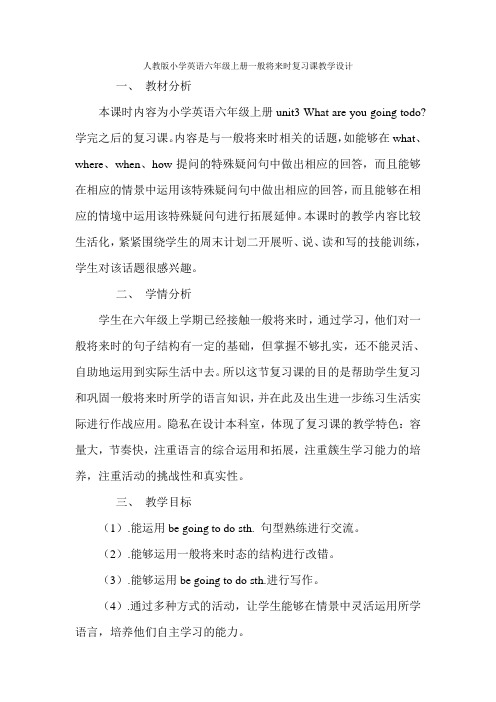
人教版小学英语六年级上册一般将来时复习课教学设计一、教材分析本课时内容为小学英语六年级上册unit3 What are you going todo?学完之后的复习课。
内容是与一般将来时相关的话题,如能够在what、where、when、how提问的特殊疑问句中做出相应的回答,而且能够在相应的情景中运用该特殊疑问句中做出相应的回答,而且能够在相应的情境中运用该特殊疑问句进行拓展延伸。
本课时的教学内容比较生活化,紧紧围绕学生的周末计划二开展听、说、读和写的技能训练,学生对该话题很感兴趣。
二、学情分析学生在六年级上学期已经接触一般将来时,通过学习,他们对一般将来时的句子结构有一定的基础,但掌握不够扎实,还不能灵活、自助地运用到实际生活中去。
所以这节复习课的目的是帮助学生复习和巩固一般将来时所学的语言知识,并在此及出生进一步练习生活实际进行作战应用。
隐私在设计本科室,体现了复习课的教学特色:容量大,节奏快,注重语言的综合运用和拓展,注重簇生学习能力的培养,注重活动的挑战性和真实性。
三、教学目标(1).能运用be going to do sth. 句型熟练进行交流。
(2).能够运用一般将来时态的结构进行改错。
(3).能够运用be going to do sth.进行写作。
(4).通过多种方式的活动,让学生能够在情景中灵活运用所学语言,培养他们自主学习的能力。
(5).培养学生团结友爱、助人为乐的良好品质。
使学生愿意在小组活动中积极与他人合作,互相帮助,共同完成学习任务。
四、教学过程1、热身①sing a song②Daily show③Free talk2、知识梳理再现①复习句型What are you going to do?出示图片和将来时的时间,让学生来造句,让学生进入一般将来时的语境中。
学生自由结组,操练句型老师拿手中的卡片问学生,what are you going to do?学生回答。
然后让学生之间相互问候。
六年级上一般现在时现在进行时一般将来时专项练习
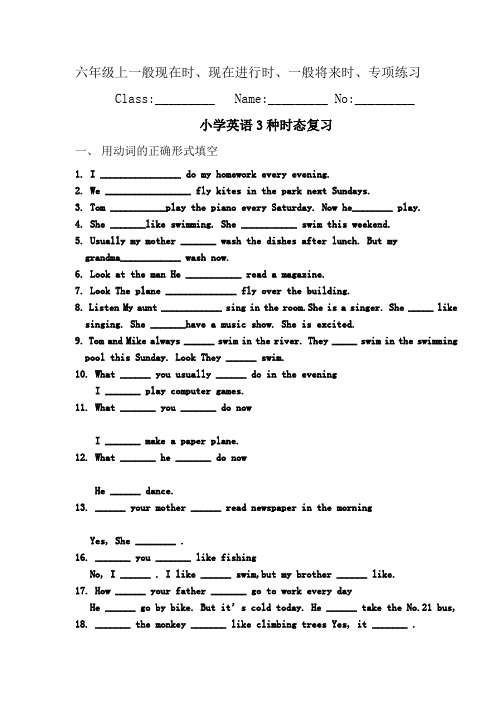
六年级上一般现在时、现在进行时、一般将来时、专项练习Class:_________ Name:_________ No:_________小学英语3种时态复习一、用动词的正确形式填空1. I ________________ do my homework every evening.2. We _________________ fly kites in the park next Sundays.3. Tom ___________play the piano every Saturday. Now he________ play.4. She _______like swimming. She ___________ swim this weekend.5. Usually my mother _______ wash the dishes after lunch. But mygrandma____________ wash now.6. Look at the man He ___________ read a magazine.7. Look The plane ______________ fly over the building.8. Listen My aunt ____________ sing in the room.She is a singer. She _____ like singing. She _______have a music show. She is excited.9. Tom and Mike always ______ swim in the river. They _____ swim in the swimming pool this Sunday. Look They ______ swim.10. What ______ you usually ______ do in the eveningI _______ play computer games.11. What _______ you _______ do nowI _______ make a paper plane.12. What _______ he _______ do nowHe ______ dance.13. ______ your mother ______ read newspaper in the morningYes, She ________ .16. _______ you _______ like fishingNo, I ______ . I like ______ swim,but my brother ______ like.17. How ______ your father _______ go to work every dayHe ______ go by bike. But it’s cold today. He ______ take the No.21 bus, 18. _______ the monkey _______ like climbing trees Yes, it _______ .19. What _______ your father ______ do after lunch He _______ read a comic book.20. ________ you ______ collect stamps Yes. I _______ .________ your brother ______ collect, too No, he ________ .二、选择题1. _____ he _____ to the park at 6:30 in the morning No,he _____ .A. Does; goes; doesB. Does; go; doesn’tC. Does; go; does2. Tim always _____ a picture at home. He _____ a car now.A. draws; is drawingB. draw; drawC. draws; draw3. She usually _____ her friends. They often _____ tea.A. see; drinkB. sees; drinksC. sees; drink4. He usually _____ the dishes at night, but tonight he _____ clothes.A. wash; washB. washes; is going to washC. is washing; washes5. Mr. Green usually _____ his newspaper in the evening, but he and his wife _____ television this evening.A. reads; watchesB. reads; are going to watchC. reads; watch6.Where are the man and the womanThey _____ near the tree.A. sitB. sitsC. are sitting7. _____ your father _____ divingNo, he _____ .He ______ writing stories.A. Does; like; doesn’t; likesB. Does; likes; doesn’t; likeC. Do; like; don’t; likes8. Mr. Green often _____ his newspapers at night. But he _____ an interestingbook tonight.A. reads; readsB. reads; readC. reads; is going to read9. The old man _____ playing sports in the park. He _____ morning exercise now.A. likes; is doingB. likes; doesC. like; doing10. Where ______ the boy _____He _____ across the river now.A. does; swim; swimsB. is; swimming; is swimmingC. is, swim, is swimming11. _____ you _____ to music nowYes, we _____ .A. Do; listen; doB. Did; listen; didC. Are; listening; are12. Look Two cats ______ across the wall.A. runB. runsC. are running13. She _____ tea, but he _____ .A. likes; doesn’t B; like; don’t C. like; doesn’t。
(完整版)小学六年级英语四种时态复习
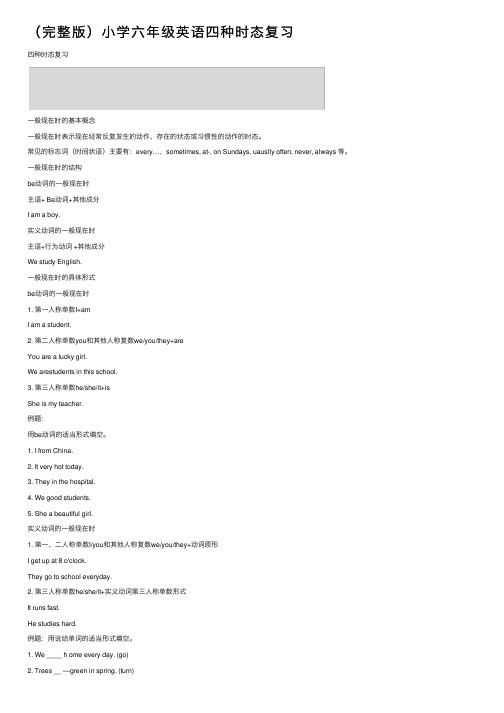
(完整版)⼩学六年级英语四种时态复习四种时态复习⼀般现在时的基本概念⼀般现在时表⽰现在经常反复发⽣的动作、存在的状态或习惯性的动作的时态。
常见的标志词(时间状语)主要有:every…,sometimes, at-, on Sundays, uauslly often, never, always 等。
⼀般现在时的结构be动词的⼀般现在时主语+ Be动词+其他成分I am a boy.实义动词的⼀般现在时主语+⾏为动词 +其他成分We study English.⼀般现在时的具体形式be动词的⼀般现在时1. 第⼀⼈称单数I+amI am a student.2. 第⼆⼈称单数you和其他⼈称复数we/you/they+areYou are a lucky girl.We arestudents in this school.3. 第三⼈称单数he/she/it+isShe is my teacher.例题:⽤be动词的适当形式填空。
1. I from China.2. It very hot today.3. They in the hospital.4. We good students.5. She a beautiful girl.实义动词的⼀般现在时1. 第⼀、⼆⼈称单数I/you和其他⼈称复数we/you/they+动词原形I get up at 8 o'clock.They go to school everyday.2. 第三⼈称单数he/she/it+实义动词第三⼈称单数形式It runs fast.He studies hard.例题:⽤说给单词的适当形式填空。
1. We ____ h ome every day. (go)2. Trees __ —green in spring. (turn)3. He ____ very hard. (study)4. The boy - ___ up at seven O'clock. (get)5. The earth ____ round the sun. (move)补充:主语为第三⼈称单数形式,谓语动词的变化规则:般现在时的句型变化 be 动词的⼀般现在时否定句主语 + be 动词 + not +其他He is not a worker.特殊疑问句特殊疑问词 + ⼀般疑问句Where is he?例题:写出下列句⼦中所缺的be 动词,并⽤肯定及否定形式回答。
小学英语六年级下第四单元总结

小学英语六年级下第四单元总结一般将来时:表示将来某一时刻将要发生的动作或存在的状态.构成:1. 肯定句: 主语+will+动原 2.肯定句: 主语+be going to +动原否定句:主语+will +not +动原否定句:主语+be +not +going to +动原一般疑: Will +主语+动原? 一般疑:Be + 主语+going to+动原?肯回:Yes,主语+will. 肯回: Yes,主语+be.否回:No, 主语+will +not . 否回: No, 主语+be+not .短语和句型:go on a trip (旅行) take a plane (乘飞机) plan to do (计划做某事) the capital of (…的首都)in the north of 在…北部(内部) to the north of 在…北方(不接壤) on the north of 在…北边(接壤) far from (远离) learn a lot (学到很多) here’s +名单=this is…(这是…)one of +形容词最高级+名词复数(最…之一) all these famous places (所有这些著名的地方) would like = want 想要…Would you like+do…?= Do you want do …? 你想要做…?中外名胜古迹:West Lake Big Benthe Great Wall Tower Bridgethe Ming tombs Disneylandthe Summer Place the CN Towerthe temple of Heaven Niagara Fallsthe Forbidden City Sydney Opera House题型:(对划线部分提问)We are going to Xian. We are going to visit Big Ben tomorrow.Where are you going? When are you going to visit Big Ben?They will go to Hainan by train.How will they go to Hainan.?。
小学六年级英语知识点总结

【导语】学会整合知识点。
把需要学习的信息、掌握的知识分类,做成思维导图或知识点卡⽚,会让你的⼤脑、思维条理清醒,⽅便记忆、温习、掌握。
以下是整理的《⼩学六年级英语知识点总结》,希望帮助到您。
【语法知识】 ⼀、⼀般将来时 表⽰将要打算发⽣的事情或动作,常与tomorrow, next week(year; Tuesday…), this week( weekend ;evening; afternoon;…)today等词连⽤。
结构是主语+be(am, is, are) going to + 动原或主语+will +动原。
如:What are you going to do tomorrow? I am going to have a picnic.你明天要去⼲嘛?我要去野餐。
The childre are going to have a sports meeting next week.孩⼦们下个星期将参加运动会。
Tom will/is going to see a play with his father this evening.Tom今晚将和⽗母去看演出。
问句将be动词或will移前;否定句在be动词或will后加not. ⼆、情态动词can; can’t; should; shouldn’t; must; may后⼀定加动词原形。
如:The girl can’t swim, but he can skate.⼥孩不会游泳,但是会滑冰 Don’t talk in class, you should listen to the teacher carefully.不要再课上说话,你应该认真听⽼师讲。
三、祈使句肯定祈使句以动词原形开头;否定祈使句以don’t加动词原形开头。
如:Open the box for me ,please.请为我打开盒⼦。
Liu Tao! Please get up earlier tomorrow.刘涛,明天请早点起床 !Don’t walk on the grass!不要在草地上⾛! Helen! Don’t climb the tree,please.海伦!不要爬树。
- 1、下载文档前请自行甄别文档内容的完整性,平台不提供额外的编辑、内容补充、找答案等附加服务。
- 2、"仅部分预览"的文档,不可在线预览部分如存在完整性等问题,可反馈申请退款(可完整预览的文档不适用该条件!)。
- 3、如文档侵犯您的权益,请联系客服反馈,我们会尽快为您处理(人工客服工作时间:9:00-18:30)。
一般将来时1、定义:一般将来时表示将来某个时间要发生的动作或存在的状态2、结构:主语+will\shall\be going to+v(动词原形)+其他例如:It is going to rain. 要下雨了。
We are going to have a meeting today. 今天我们准备开一个会。
Tomorrow will be Sunday. 明天就是星期天。
The rain will stop soon. 雨很快就要停了。
I shall not go. 我不准备去了。
What shall we do for summer holiday?暑假我们做什么呢?注意:a.will用于所有人称,shall用于第一人称(we.I)b. will 常简略为'll,并与主语连写在一起,如:I'll,he'll,it'll,we'll,you'll,they'll。
c. 一般疑问句如用will you…?其简略答语须是Yes,I will或No,I won't;3、时间标志:常常和表示将来的时间状语连用。
如:tomorrow(明天),next week(下周),from now no(从现在开始),in the future(将来),soon, in 2015, in two days(两天之后)等。
四种句式:1. be going to +动词原形1.肯定句主语+be(am /,is,/ are) going to +动词原形+其它My sister is going to learn English next year. 我姐姐准备明年学英语。
2.否定句主语+be(am / is / are)not going to +动词原形+其它I am not going to(go to)the cinema tonight. 我今天晚上不打算去看电影。
3.一般疑问句Be (am / is / are)+主语+going to+动词原型+其它?Is your father going to play basketball with you ?No , he isn’t。
你父亲打算和你去打篮球吗?不。
4.特殊疑问句特殊疑问词(Wh-)+一般疑问句?Where are you going to spend Spring Fesital.? 春节你打算在哪过?2.will /shall +动词原形(在书面语中,主语是第一人称I,We时,常用shall)1.肯定句主语+will/shall+动词原形+其它I (shall) write to him next week. 下周我将给他写信。
2.否定句主语+ will /shall+ not + 动词原形+其它They won’t watch TV this evening。
今天晚上他们不看电视。
3.一般疑问句will/shall+主语+动词原形+其它Will you stay at home with us tomorrow ?明天你和我们呆在家里好吗?4.特殊疑问句特殊疑问词(Wh-) +一般疑问句When will your father be back? 你爸爸什么时侯回来?注意:be或will提到句首,some改为any,and改为or,第一二人称互换。
一、选择正确的代词填空。
1. Open the door for __________ (I, me) please.2. Catch __________ (he, him)! He’s a thief.3.I love Mickey very much. What about __________ (you, your)?4.__________ (They, Them) are my classmates.5.Look at __________ (they, them). They are drawing pictures.6.Are these oranges __________ (their, theirs)?7.The blue bike is __________ (her, his), not mine.8.Look at the car. __________ (I t’s, Its) colour is black.9.Your bags are green __________ (their, theirs) are yellow.10.Their school is in the country. __________ (Our, Ours) school is in the city.练习:填空。
1. 我打算明天和朋友去野炊。
I_____ _______ _________ have a picnic with my friends.I ________ have a picnic with my friends.2. 下个星期一你打算去干嘛? 我想去打篮球。
What ________ ________ _________ _________ _________ next Monday? I _______ ______ _____ play basketball.What _________ you do next Monday? I ________ play basketball.3. 你妈妈这个周末去购物吗?是,她要去买一些水果。
_____ your mother _______ ________ go shopping this ___________?Yes, she _________. She ______ ________ __________ buy some fruit.4. 你们打算什么时候见面。
What time _______ you _________ __________ meet?改句子。
5. Nancy is going to go camping.(改否定)Nancy ________ going to go camping.6. I’ll go and join them.(改否定)I _______ go ______ join them.7. I’m going to get up at 6:30 tomorrow.(改一般疑问句)________ _______ ________ to get up at 6:30 tomorrow?8. We will meet at the bus stop at 10:30.(改一般疑问句)_______ ________ meet at the bus stop at 10:30.9. She is going to listen to music after school.(对划线部分提问)________ _______ she ________ ________ _________ after school?10. My father and mother are going to see a play the day after tomorrow.(同上) _________ _________ going to see a play the day after tomorrow.用所给词的适当形式填空。
11. Today is a sunny day. We ___________________ (have) a picnic this afternoon.12. My brother _______________ (go) to Shanghai next week.13. Tom often ______________(go) to school on foot. But today is rain. He ______________ (go) to school by bike.14. What do you usually do at weekends? I usually __________ (watch) TV and ____________(catch) insects?15. It’s Friday today. What _____she _________ (do) this weekend? She ______________ (watch) TV and _____________ (catch) insects.16. What ___________ (d0) you do last Sunday? I ____________ (pick) appleson a farm. What ______________ (do) next Sunday? I ______________ (milk) cows.17. Mary ____________ (visit) her grandparents tomorrow.18. Liu Tao ____________ (fly) kites in the playground yesterday.19. David ______________ (give) a puppet show next Monday.20. I ________________ (plan) for my study now一、单项选择。
( ) 1. There __________ a meeting tomorrow afternoon.A. will be going toB. will going to beC. is going to beD. will go to be( ) 2. Charlie ________ here next month.A. isn’t workingB. doesn’t workingC. isn’t going to workingD. won’t work( ) 3. He ________ very busy this week, he ________ free next week.A. will be; isB. is; isC. will be; will beD. is; will be( ) 4. There ________ a dolphin show in the zoo tomorrow evening.A. wasB. is going to haveC. will haveD. is going to be( ) 5. –________ you ________ free tomorrow?– No. I ________ free the day after tomorrow.A. Are; going to; willB. Are; going to be; willC. Are; going to; will beD. Are; going to be; will be( ) 6. Mother ________ me a nice present on my next birthday.A. will givesB. will giveC. givesD. give( ) 7. – Shall I buy a cup of tea for you?–________. (不,不要。
